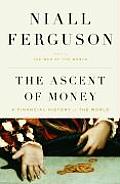
PREV ARTICLE
NEXT ARTICLE
FULL ISSUE
PREV FULL ISSUE
V11 2008 INDEX
E-SYLUM ARCHIVE
BOOK REVIEW: THE ASCENT OF MONEY BY NIALL FERGUSON
Arthur Shippee forwarded this review from The New York Times which he found noted in The Explorator newsletter. -Editor
 And in his latest book, “The Ascent of Money” — humbly subtitled “A Financial History of the World” — Ferguson takes us on an often enlightening and enjoyable spelunking tour through the underside of great events, a lesson in how the most successful great powers have always been underpinned by smart money. “The ascent of money has been essential to the ascent of man,” he writes, making a conscious reference to the BBC production he loved as a boy, Jacob Bronowski’s “Ascent of Man.”
And in his latest book, “The Ascent of Money” — humbly subtitled “A Financial History of the World” — Ferguson takes us on an often enlightening and enjoyable spelunking tour through the underside of great events, a lesson in how the most successful great powers have always been underpinned by smart money. “The ascent of money has been essential to the ascent of man,” he writes, making a conscious reference to the BBC production he loved as a boy, Jacob Bronowski’s “Ascent of Man.”“Behind each great historical phenomenon there lies a financial secret,” Ferguson says. He goes into fascinating detail about how “it was Nathan Rothschild as much as the Duke of Wellington who defeated Napoleon at Waterloo” by selling bonds and stockpiling gold for the British Army. The richest bankers on the Continent in the 19th century, the Rothschilds became known as die Finanzbonaparten (the Bonapartes of finance). And, as Ferguson argues, they also played a crucial part in the South’s defeat in the Civil War by declining to invest in Confederate cotton-collateralized bonds.
Imperial Spain amassed vast amounts of bullion from the New World, but it faded as a power while the British and Dutch empires prospered because they had sophisticated banking systems and Spain did not. Similarly, the French Revolution was made all but inevitable by the machinations of an unscrupulous Scotsman named John Law, whom the deeply indebted French monarchy recklessly placed in charge of public finance.
“It was as if one man was simultaneously running all 500 of the top U.S. corporations, the U.S. Treasury and the Federal Reserve System,” Ferguson writes. Law proceeded to single-handedly create the subprime mortgage bubble of his day. When it collapsed, the fallout “fatally set back France’s financial development, putting Frenchmen off paper money and stock markets for generations.”
To read the complete review, see: Follow the Money (http://www.nytimes.com/2008/12/28/books/review/Hirsh-t.html)
Wayne Homren, Editor
The Numismatic Bibliomania Society is a non-profit organization promoting numismatic literature. See our web site at coinbooks.org.
To submit items for publication in The E-Sylum, write to the Editor at this address: whomren@gmail.com
To subscribe go to: https://my.binhost.com/lists/listinfo/esylum
All Rights Reserved.
NBS Home Page
Contact the NBS webmaster
